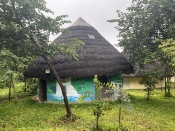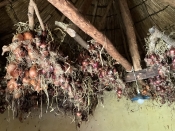 |
Kumbali Projekt e.V. |
 |
 |
Contents. 
. 
. 
. 
. 
|
About usKumbali Projekt e.V.Grit Wagner-Strohn Brunnweinbergstr. 2 D-71334 Waiblingen Tel.:+49(0)7151 277003 Fax: +49(0)7151 277004 Mobile:+49(0)17627180767 mailto:kumbali@railcat.de URL: http://www.kumbaliprojekt.de |
| Permaculture |
Permaculture - what does it mean?From the conception of „permanent agriculture“, over the years permaculture developed in the sense of a holistic design system for creating harmonic integrations between nature and people for mutual benefit. Permaculture can be defined as design and maintenance of sustainable urban and rural human environments which have the productivity, diversity, stability, and strength of natural ecosystems. Permaculture operates on the ethical core values
Permaculture principles
 |
 Deutsche Version
Deutsche Version